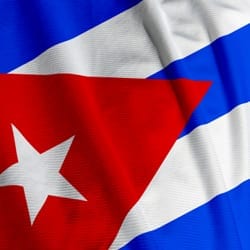When it comes to Cuba, the United States is finally catching up to Latin America and the rest of the world. Heads of state throughout Latin America have praised President Obama’s announcement Wednesday that Washington and Havana hope to restore diplomatic relations in the near future. December 17, 2014, will forever be the historic day when the Cold War’s last outpost in the Western Hemisphere began to crumble. After more than half a century of a highly restrictive policy toward Cuba that ranged from an economic embargo to prohibiting most travel by U.S. citizens to the island, the United States has finally admitted the policy’s failure. Its effort to bring freedom to the oppressed Cuban people through diplomatic isolation and economic pressure has only given the Castro brothers an excuse to blame Washington for the many failures of their regime.
Since President Obama took office in 2009, his administration has embarked on a policy discourse toward Latin America much different from that of its predecessors. The United States gradually began transforming its image in the region from that of the indifferent big kid on the block to that of an equal partner. Wednesday’s announcement helped seal this new image. During the 47th Mercosur1 Summit, which started Wednesday in Argentina, presidents of the five member countries applauded the news. Even President Maduro of Venezuela, despite the recent U.S. sanctions against his country for his government’s treatment of the opposition, applauded President Obama for his courageous decision, calling it the most important step of Obama’s presidency. Along with President Maduro, Presidents Kirchner of Argentina and Rousseff of Brazil highlighted the role of Pope Francis, who hails from Argentina, in encouraging the two countries to restore an open relationship. It is interesting — and a bit embarrassing for Latin America — that the negotiations between the U.S. and Cuba occurred under the auspices of Canada and the Vatican instead of a regional country like Mexico.
Aside from talks aimed at restoring diplomatic relations between the two countries, other steps in the administration’s new approach include: increasing remittance levels to Cuban nationals from $500 to $2,000 per quarter; allowing U.S. exports of certain products, including agricultural equipment, communication devices, software and services; allowing imports of Cuban products, including cigars and rum; improving Internet access for Cubans; and easing travel restrictions between the two countries. Cubans have actually been free to travel to the United States (if they qualify for a visa) since January of last year, when Raúl Castro’s government reformed the migration policy put in place by Fidel Castro in 1961. Because of U.S. travel restrictions, however, it has been very difficult for U.S. citizens to visit the island legally.
The speed of change in U.S.-Cuban relations has been breathtaking in recent months. As late as August 2013, Fidel Castro praised NSA whistleblower Edward Snowden for revealing the “repugnant and dishonest policy of the powerful empire that lies and tricks the world.”
However, there should be no illusions about the Cuban regime. As Arturo López Levy, a lecturer at the University of Denver, has stressed, Raúl Castro is no liberal democrat who has come out of the closet. For instance, we have yet to see how much Internet access he will permit and whether he will allow improvements to telecommunications mechanisms such as infrastructure.
U.S. critics of President Obama’s new approach — such as Sens. Marco Rubio, R-Fla., and Bob Menendez, D-N.J. — are outraged to see the U.S. granting concessions to the Castro government without any commitment on Cuba’s part to change its authoritarian practices. Nonetheless, any increase, however small, in the information flow through improved telecommunications between the U.S. and Cuba should be reason to celebrate. Moreover, what better ambassadors for democracy could the United States have than its own citizens traveling freely to Cuba and interacting with the people? Members of the U.S. Congress need to put aside their understandable but overheated responses and look at the myriad of opportunities that Obama’s change of policy could bring. In the words of Cuban poet, patriot and freedom fighter José Marti: “Al igual que las piedras rodando pos las colinas, las ideas justas alcanzan sus objetivos a pesar de todos los obstáculos y barreras. Puede ser posible acelerarlos o dificultarlos, pero imposible de detenerlos (Like stones rolling down hills, fair ideas reach their objectives despite all obstacles and barriers. It may be possible to speed or hinder them, but impossible to stop them).”
1. A political and economic agreement created in 1991 that promotes free movement of people, goods and services among its member states — Argentina, Brazil, Uruguay, Paraguay and Venezuela.
Erika de la Garza is the program director of the Latin America Initiative at the Baker Institute. Her chief areas of interest include U.S.-Latin American relations; emerging leadership; coalition building between public, private and civil society actors; and trade and business development in Latin America.
